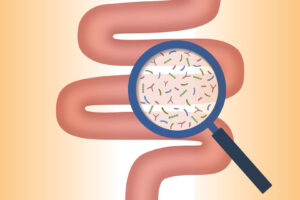If you have ever seen an image of the gastrointestinal system, you know it’s a busy place. Looking at the miles of intestines squeezed in around the body’s vital organs, it’s understandable why we all experience stomach discomfort now and then.
But many people suffer from gastrointestinal (GI) pain and unpleasant symptoms for too long before seeking medical help or they choose to self-medicate. I met with a 34-year-old patient from Mercer County who had been self-medicating with over-the-counter drugs to soothe her ongoing heartburn and acid reflux. But two years later, her symptoms continued. After performing a simple examination, I diagnosed her with Celiac disease, a treatable autoimmune condition from eating gluten, a protein found in wheat. A few weeks after starting on medication and removing gluten from her diet, her two-year battle with pain was over.
Milk and Gluten Cause the Majority of Stomach Problems
Many chronic stomach issues are not due to defective intestines—they are the result of what we consume. Milk and gluten are often the culprits for many gastrointestinal issues people face. My patients are always surprised when I tell them they don’t need to drink regular cow’s milk and can switch to lactose-free milk to minimize abdominal pain, gas and bloating.
People with lactose intolerance are unable to fully digest lactose in milk. As a result, they have harmless but unpleasant symptoms including diarrhea, gas and bloating. The good news is if you simply find another source of milk—such as almond, soy or lactose-free milk–symptoms may subside. An over-the-counter medication can also help offset unpleasant after-effects when you’ve consumed dairy products.
Gluten sensitivity is also responsible for many GI symptoms. Again, once diagnosed, forego products containing gluten (or replace them with gluten-free foods) and your entire body will thank you—not just your stomach. Gluten can cause other types of inflammation in the body which, in the most severe cases, can cause debilitating symptoms that interfere with the daily quality of life.
Are You Gluten Sensitive?
The best way to test for gluten sensitivity is to have a blood test to check for immune markers and undergo an endoscopic biopsy of the duodenal mucosa. If the endoscopy and immune markers are negative, you can still try a gluten-free diet to determine if symptoms are minimized. A low FODMAP (Fermentable Oligo-Di-monosaccharides and Polyols) diet, which limits foods high in fructose, lactose, fructans, galactan and polyols, can also be recommended for people with recurrent pain, gas and bloating.
An Unlikely, But Worst Case Scenario – Pancreatic Cancer
In one of the most serious but rare scenarios, stomach pain can be an indicator of pancreatic cancer, predicted to be one of the top cancer killers by 2030. Often asymptomatic, this cancer type can spread undetected. When symptoms eventually appear, they may include yellowing of the skin and whites of the eyes; upper abdominal pain radiating to the back; loss of appetite; weight loss and bloating.
When to See a Doctor
If you have ongoing stomach pain that lasts more than a few days, get it checked out by your family doctor or a gastroenterologist for recurrent issues. While severe stomach pain may be frightening, more often than not, the situation is acute (temporary) and can be promptly resolved with medication or dietary changes.
CentraState Medical Center’s Physician Finder offers an extensive roster of highly skilled, board-certified doctors, including gastroenterologists online at centrastate.com/physicians or by calling 866-CENTRA7 (866-236-8727).
The Statesir Cancer Center at CentraState offers comprehensive preventive, diagnostic, treatment and support services led by a team of highly-skilled oncologic physician specialists. For more information, call (855) 411-CANCER or visit centrastatecancercenter.com.
 Vasudha Dhar, MD is a board-certified gastroenterologist on staff at CentraState Medical Center. She also serves as assistant professor of clinical medicine at Columbia University. Dr. Dhar can be reached at the Windsor Center for Digestive Health in East Windsor by calling 609-918-1235.
Vasudha Dhar, MD is a board-certified gastroenterologist on staff at CentraState Medical Center. She also serves as assistant professor of clinical medicine at Columbia University. Dr. Dhar can be reached at the Windsor Center for Digestive Health in East Windsor by calling 609-918-1235.





